Engaging with China — the moral challenge of our time
Any deal with Beijing will result in a dead end, especially for the Vatican
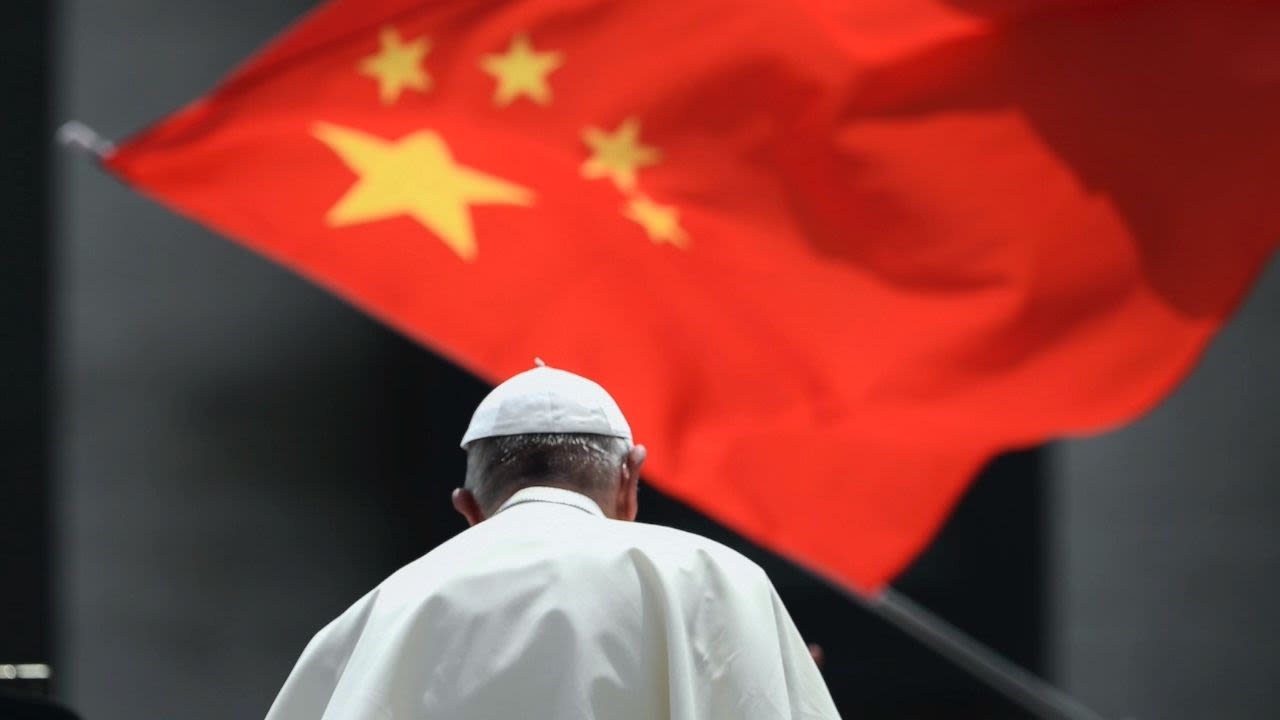
After three years of imprisonment and torture human rights lawyer Gao Zhisheng was released in 2014 only to be forced into home detention.
In August 2017, Gao was disappeared by Chinese state security; since then there’s been no word from the communist authorities about his wellbeing.
Known for his fearless defense of China’s religious minorities and the downtrodden, the Christian lawyer has been described as being the ‘conscience of China.’ If you know what Gao and his family have been subjected to, you’d understand him to be a man of immense courage and principle.
The week before last was the third anniversary of his disappearance, something marked by a tweet sent out by rights group Safeguard Defenders.
“As far back as 2006 human rights lawyer #GaoZhisheng knew that engagement with #China wouldn't lead to liberalization. Where is Mr. Gao now? No one knows,” said the human rights NGO in its tweet which also included a link to an interview Gao did with UK paper The Guardian published Jan. 29, 2006.
“When the Nazis slaughtered Jews, the outside world condemned them,” Gao told the paper. “But the Communist Party has taken the lives of 80 million people, 13 times more than the death toll among the Jews, yet the world says nothing.”
Back then Gao’s brief history lesson on the human costs of communist rule would have been brushed off by those promoting engagement with the Chinese Communist Party (CCP), something initiated during the early 1970s by US President Richard Nixon.
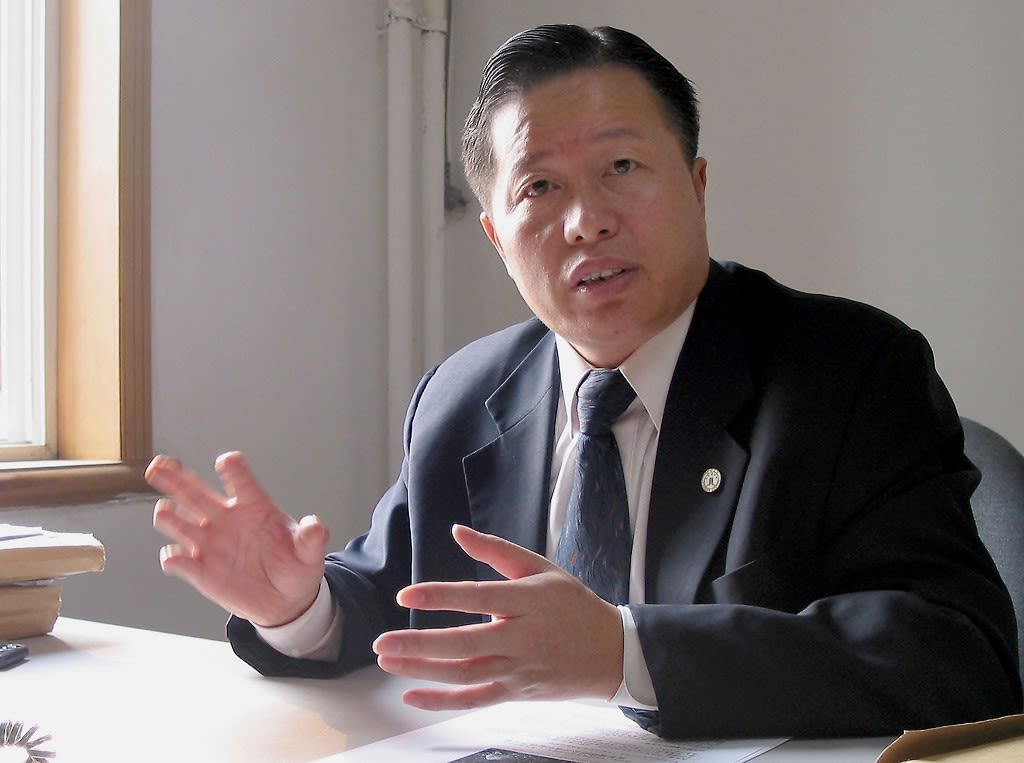
This Nov. 2, 2005 file photo shows Gao Zhisheng, head of the Beijing-based Zhisheng Legal Office, speaking during an interview at his office in Beijing. (Photo by Verna Yu/AFP)
This Nov. 2, 2005 file photo shows Gao Zhisheng, head of the Beijing-based Zhisheng Legal Office, speaking during an interview at his office in Beijing. (Photo by Verna Yu/AFP)
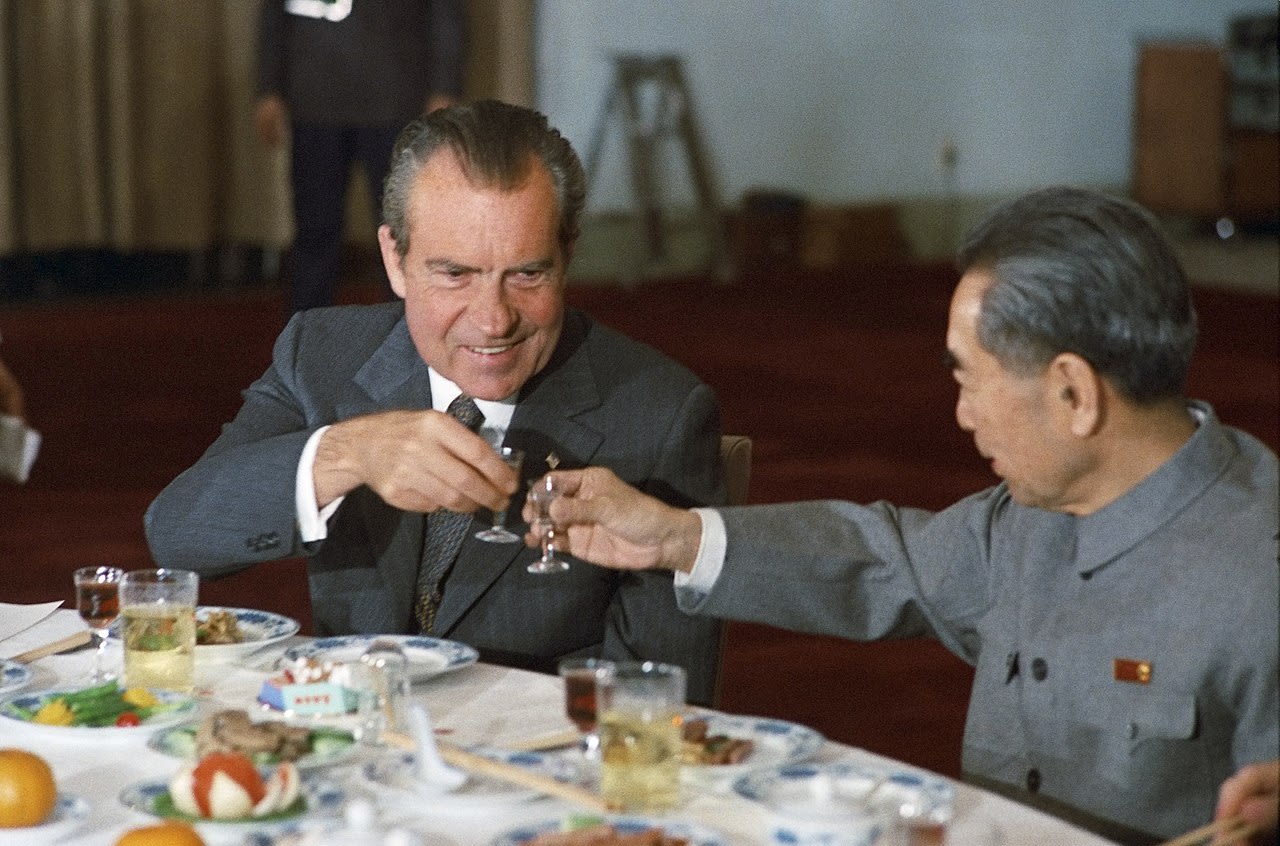
US President Richard Nixon and Chinese Premier Zhou Enlai toast during Nixon’s 1972 visit to China. (Photo from Richard Nixon Presidential Library and Museum)
US President Richard Nixon and Chinese Premier Zhou Enlai toast during Nixon’s 1972 visit to China. (Photo from Richard Nixon Presidential Library and Museum)
The engagement idea assumed the creation of a Chinese middle class and increased interaction between China and an unjudgmental, but liberal world would somehow form a more benign government in Beijing.
Obviously, that’s not what eventuated. China certainly got richer and became a super power thanks to engagement but the CCP didn’t abandon its repressive nature.
Gao was proven right.
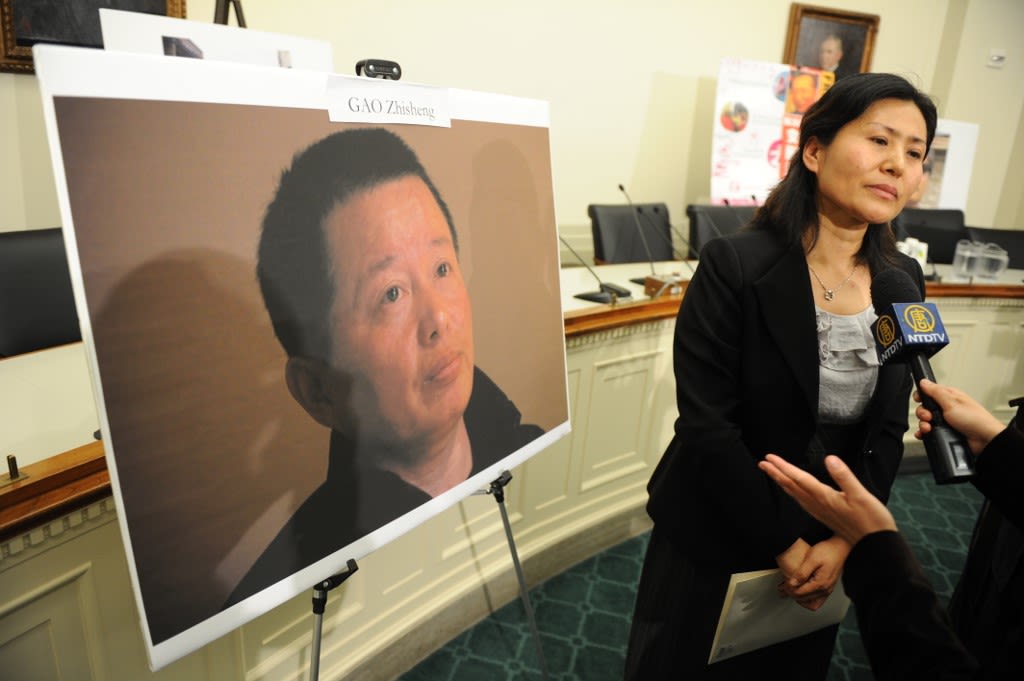
Geng He, the wife of missing Chinese dissident Gao Zhisheng participates in a press conference held by US Representatives Chris Smith (R-NJ) on Jan.18, 2011 on Capitol Hill in Washington, DC. (Photo by Tim Sloan/AFP)
Geng He, the wife of missing Chinese dissident Gao Zhisheng participates in a press conference held by US Representatives Chris Smith (R-NJ) on Jan.18, 2011 on Capitol Hill in Washington, DC. (Photo by Tim Sloan/AFP)
In its 2020 report on China released January this year Human Rights Watch (HRW) further buried the engagement with China myth.
“Few today believe that self-serving rationale, but most governments have found new ways to justify the status quo. They continue to prioritize economic opportunities in China but without the pretense of a strategy for improving respect for the rights of the people there,” HRW said.
“In fact, the Chinese Communist Party has shown that economic growth can reinforce a dictatorship by giving it the means to enforce its rule — to spend what it takes to maintain power, from the legions of security officials it employs to the censorship regime it maintains and the pervasive surveillance state it constructs. Those vast resources buttressing autocratic rule negate the ability of people across China to have any say in how they are governed.”
Today the People’s Republic of China is an Orwellian high-tech surveillance state that spends much of its resources covering up or denying its human rights abuses.
In its report, HRW said that in a bid to avoid global backlash for its crushing repression at home, the CCP has drastically ramped up efforts to undermine those international institutions intended to protect human rights.
Main photo: The closing session of the National People's Congress at the Great Hall of the People in Beijing on May 28. (Photo by Nicolas Asfouri/AFP)
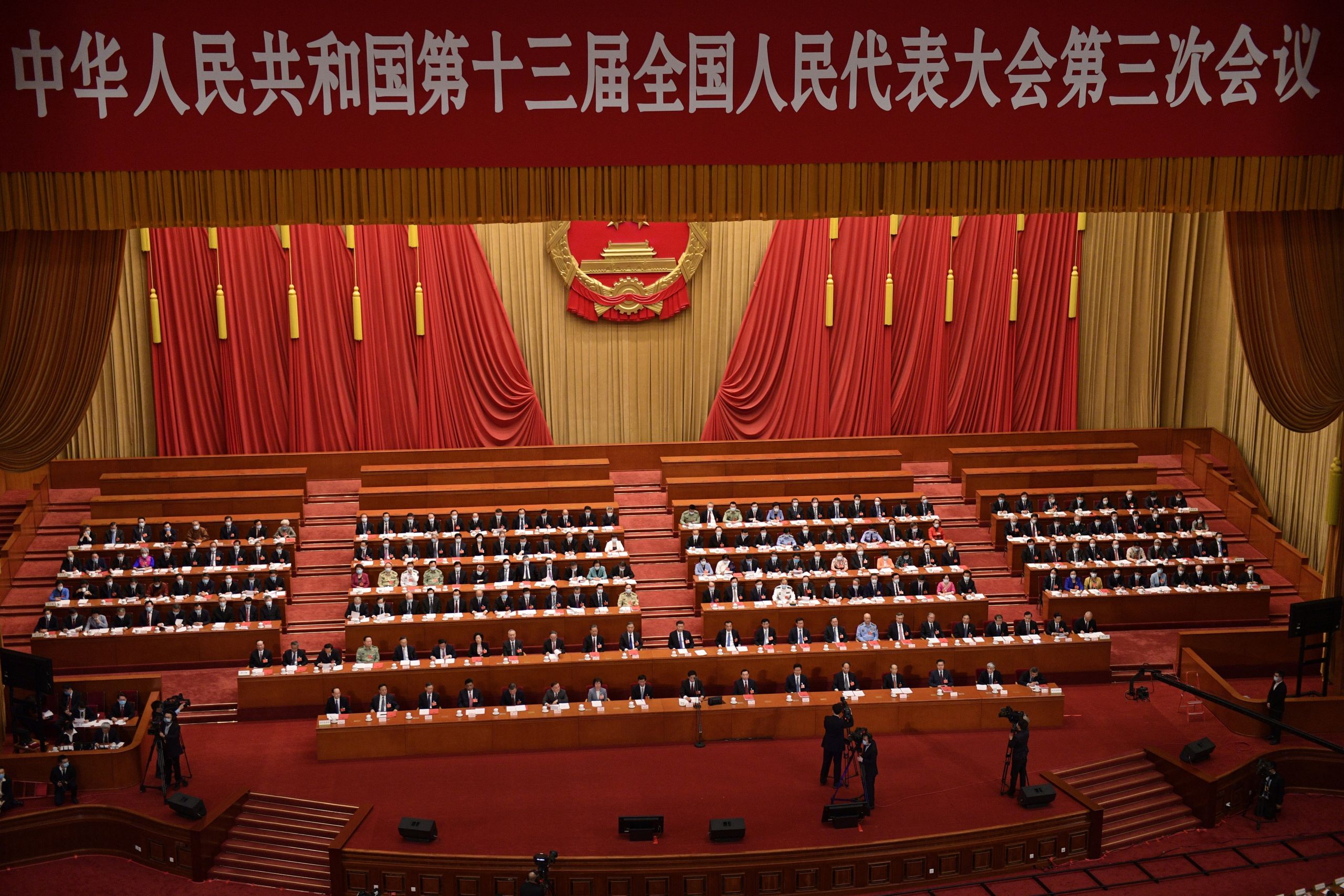
“China intimidates other governments — for example, repeatedly threatening other member states at the United Nations to protect its image and deflect discussion of its abuses,” HRW said.
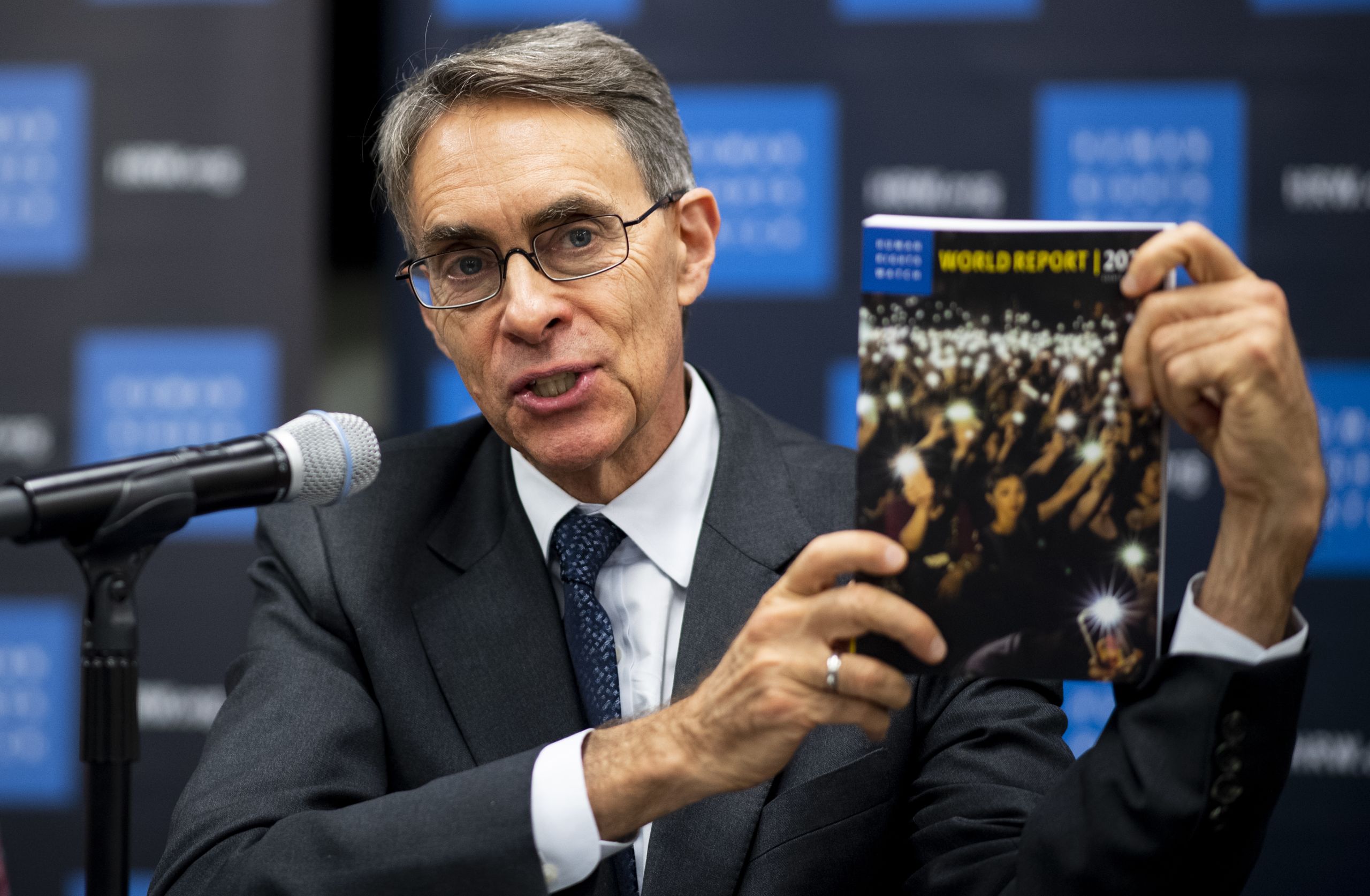
“The Chinese government is courting and is itself courted by governments, companies, and even academic institutions that ostensibly support human rights but prioritize access to China’s wealth. They know that publicly opposing Beijing’s repression puts at stake a chance at the Chinese market — 16 percent of the world’s economy — as the US National Basketball Association quickly discovered following a tweet by one team’s general manager,” HRW said.
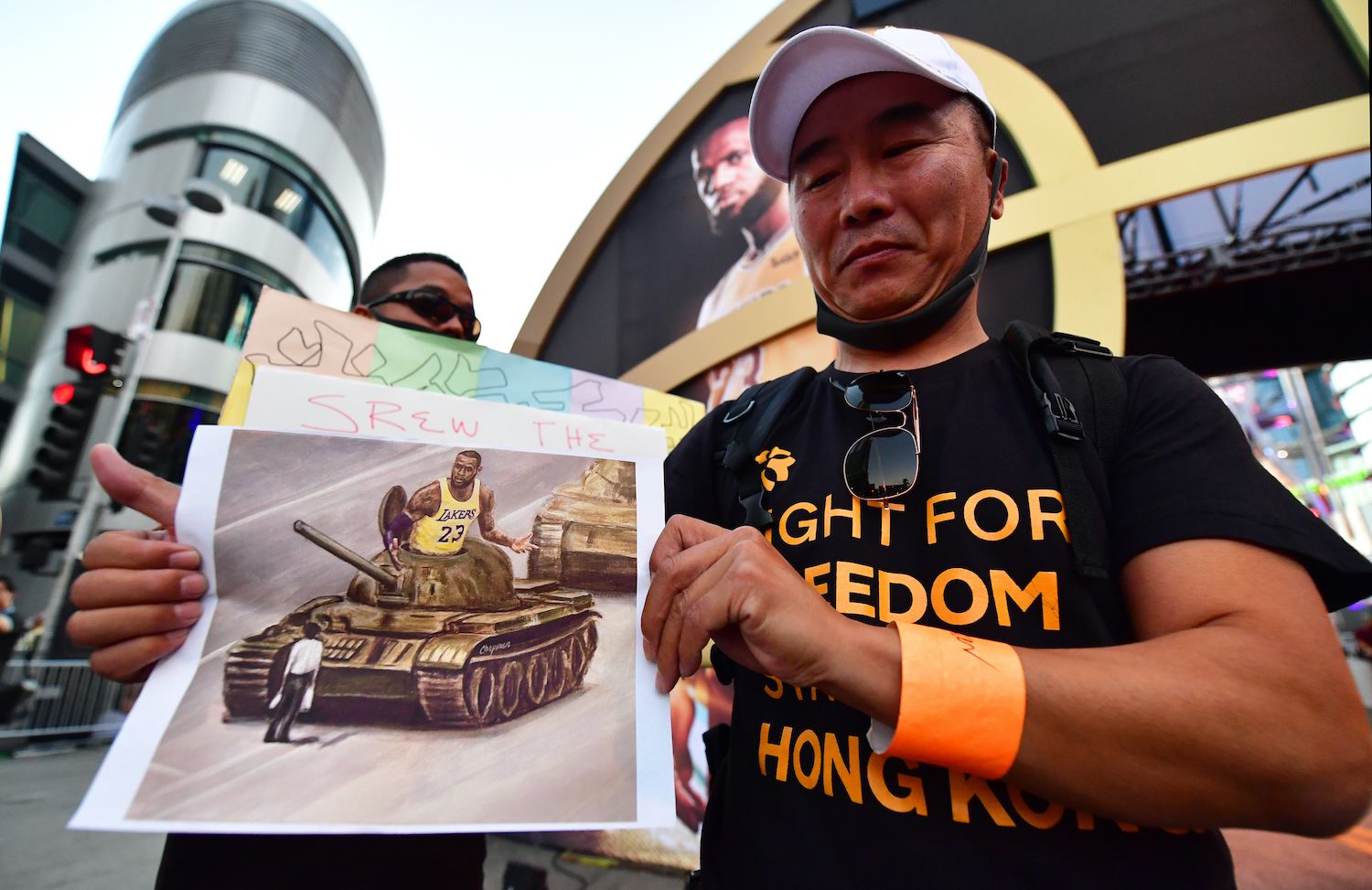
Anti-Chinese Communist Party activists protest outside Staples Center ahead of the Lakers vs Clippers NBA season opener in Los Angeles on Oct. 22, 2019. (Photo by Frederic J. Brown/AFP)
Anti-Chinese Communist Party activists protest outside Staples Center ahead of the Lakers vs Clippers NBA season opener in Los Angeles on Oct. 22, 2019. (Photo by Frederic J. Brown/AFP)
The HRW report included calls for action against what’s occurring in China, making it one of many appeals this year which has included a letter signed by 75 global religious leaders — among them Myanmar’s Cardinal Charles Bo and Indonesia’s Cardinal Ignatius Suharyo — who called for an end to the atrocities being committed in China’s Xinjiang region where more than a million Uyghurs are being held in reeducation camps or in conditions of forced labor.
“These incarcerated Uyghurs and other Muslims are facing starvation, torture, murder, sexual violence, slave labor and forced organ extraction,” the faith leaders said in the letter released Aug. 8.
Outside of the camps the Uyghurs of Xinjiang suffer systematic rights violations.
Around the same time as the letter was issued a report on the use of mass forced sterilization campaigns against Uyghur women was released; adding to the long list of atrocities currently being committed.
“In the Holocaust some Christians rescued Jews. Some spoke out. To quote Dietrich Bonhoeffer, ‘Silence in the face of evil is itself evil … Not to speak is to speak. Not to act is to act’. After the Holocaust, the world said ‘Never Again’,” the faith leaders said in their letter.
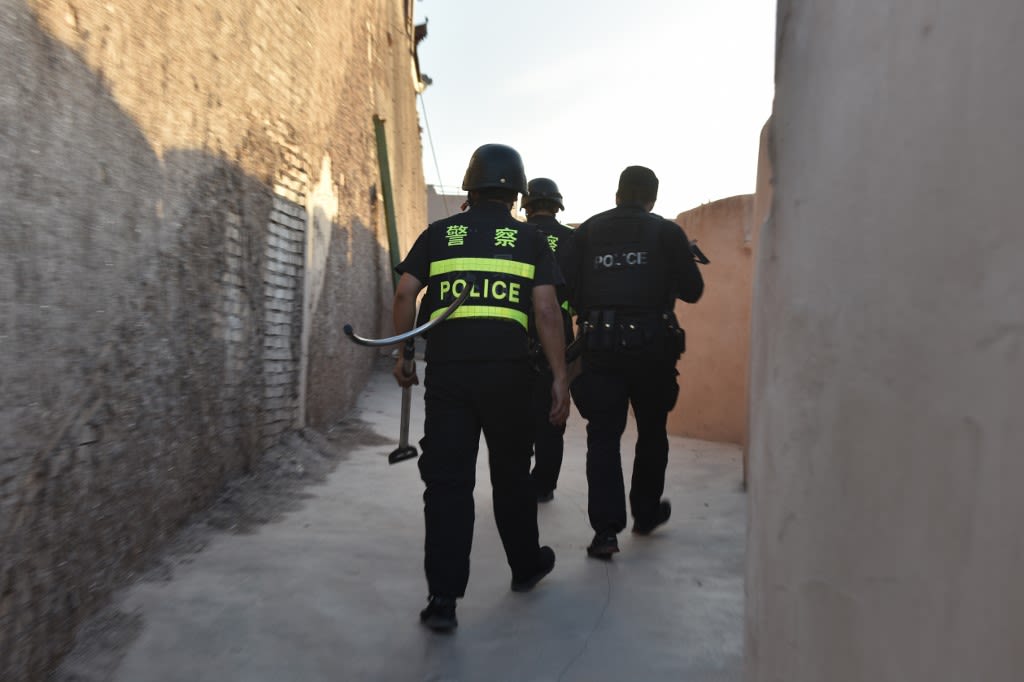
This photo taken on June 3, 2019 shows police officers patrolling in the old city area in Kashgar, in China's western Xinjiang region. (Photo by Greg Baker/AFP)
This photo taken on June 3, 2019 shows police officers patrolling in the old city area in Kashgar, in China's western Xinjiang region. (Photo by Greg Baker/AFP)
“Today, we repeat those words ‘Never Again’, all over again. We stand with the Uyghurs. We also stand with Tibetan Buddhists, Falun Gong practitioners and Christians throughout China who face the worst crackdown on freedom of religion or belief since the Cultural Revolution,” the letter said.
Main photo: This photo taken on May 31, 2019 shows watchtowers on a high-security facility near what is believed to be a re-education camp where mostly Muslim ethnic minorities are detained, on the outskirts of Hotan, in China's northwestern Xinjiang region. (Photo by Greg Baker/AFP)
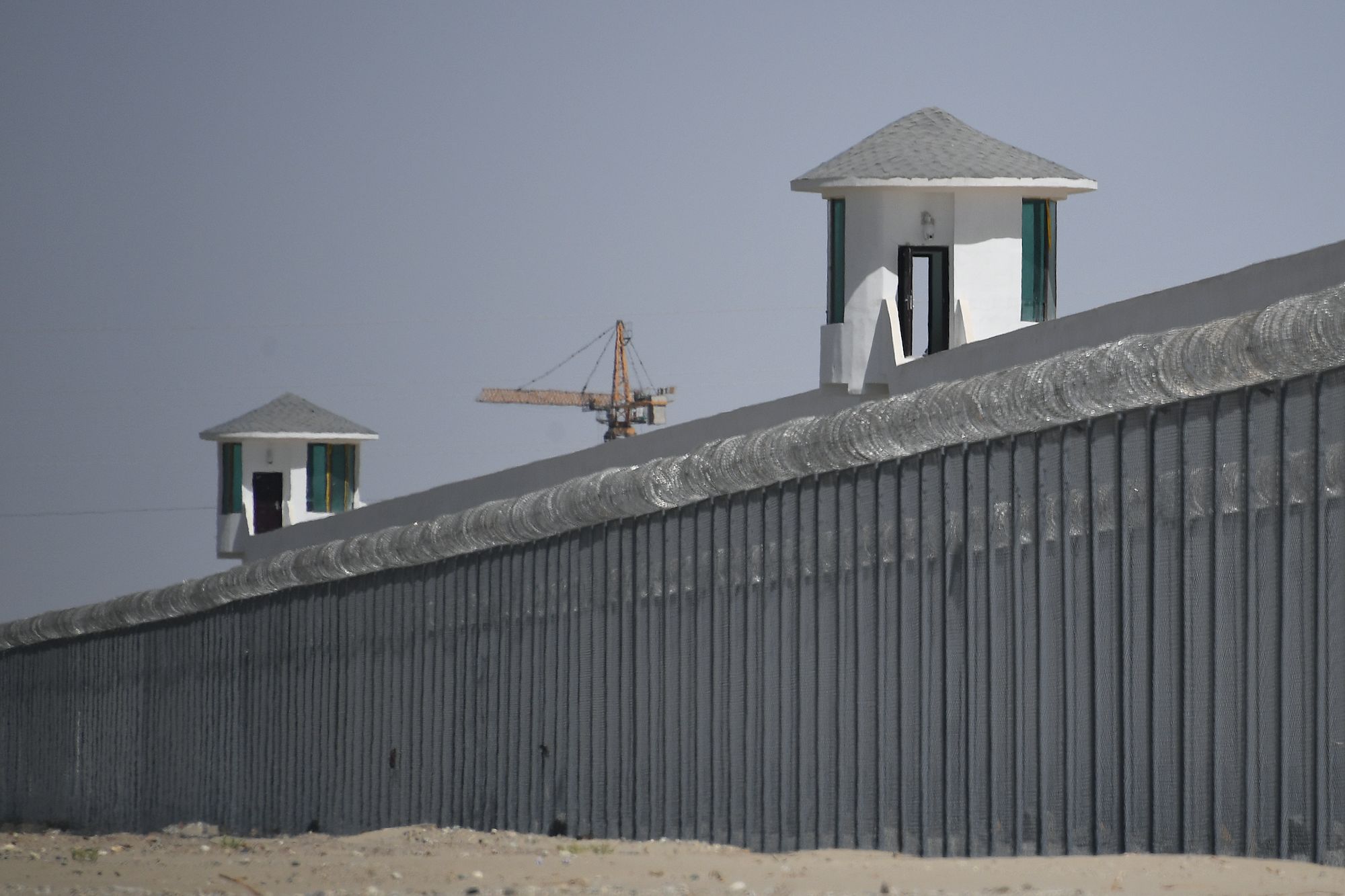
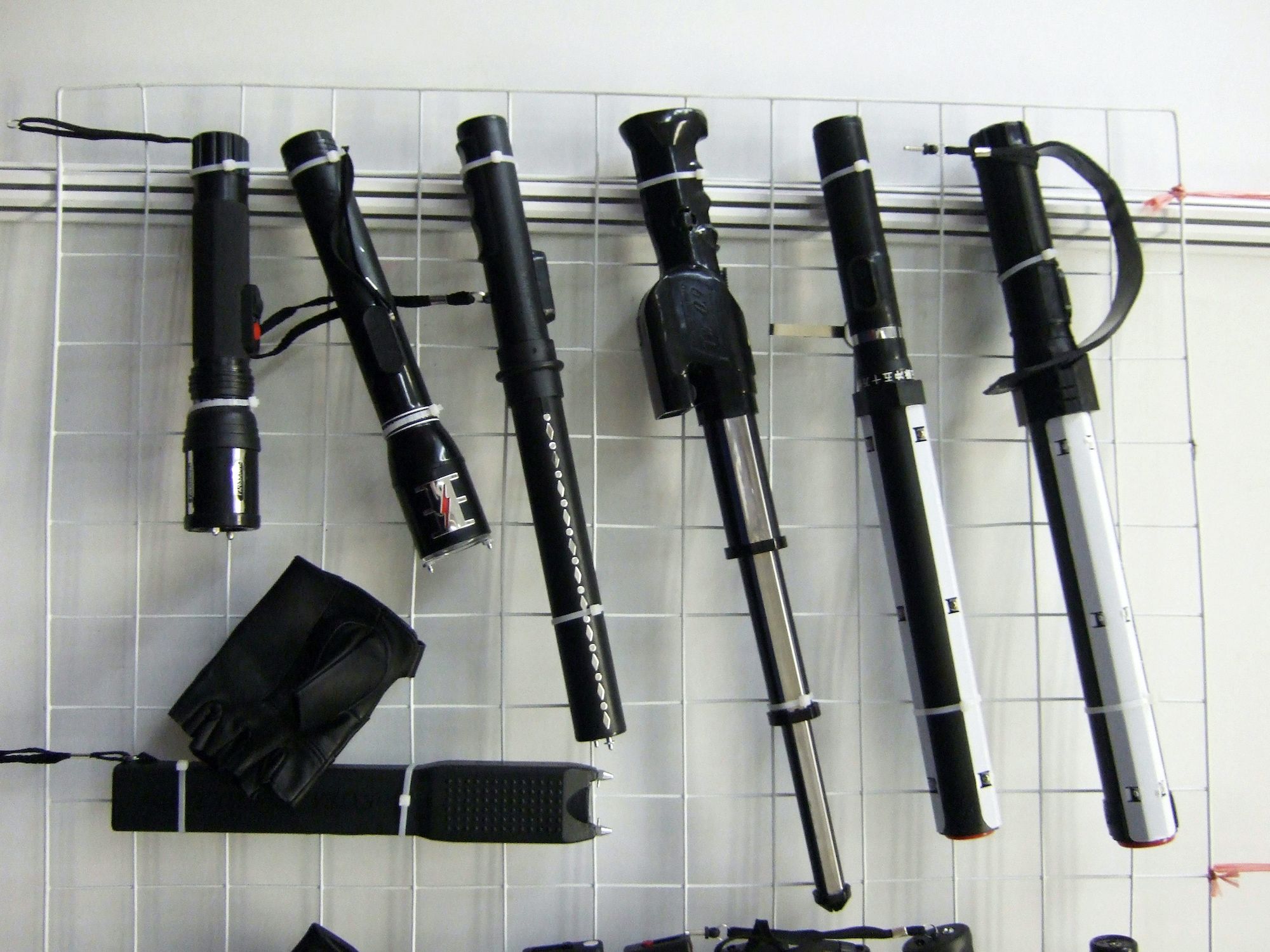
This picture taken in 2008 shows Chinese electric shock stun batons on display at a police equipment expo in China. (AFP/Amnesty International photo)
This picture taken in 2008 shows Chinese electric shock stun batons on display at a police equipment expo in China. (AFP/Amnesty International photo)
Photo: Pope Francis blesses attendees from the window of the Apostolic palace during the weekly Angelus prayer on June 14 at the Vatican. (Photo by Tiziana Fabi/AFP)
For those Catholics concerned about the situation inside China such sentiments contributed by church leaders — which also included Bishop Declan Lang of the Catholic Bishops’ Conference of England and Wales — were welcomed, especially by those troubled by the Vatican’s and Pope Francis’ public reserve over matters involving China.
The pope’s reluctance to talk publicly on China’s human rights issue has been noted this year and been the subject of opinion pieces in both the Catholic and secular media; mostly in a critical light.
A few weeks before the above letter’s release, Catholic human rights activist Benedict Rogers wrote in Foreign Policy it was Pope Francis’ “silence that shocks” him the most regarding China.
“Almost every Sunday, as he prays the Angelus, he rightly references some injustice somewhere in the world,” Rogers wrote.
“He has spoken often in the past not only of the persecution of Christians around the world but of the plight of the Rohingyas in Myanmar; the conflicts in Syria, Yemen, Ukraine, and Nigeria; and religious freedom for all,” he wrote.
“One country — and one country alone — is noticeable by its absence in his prayers and statements: China."
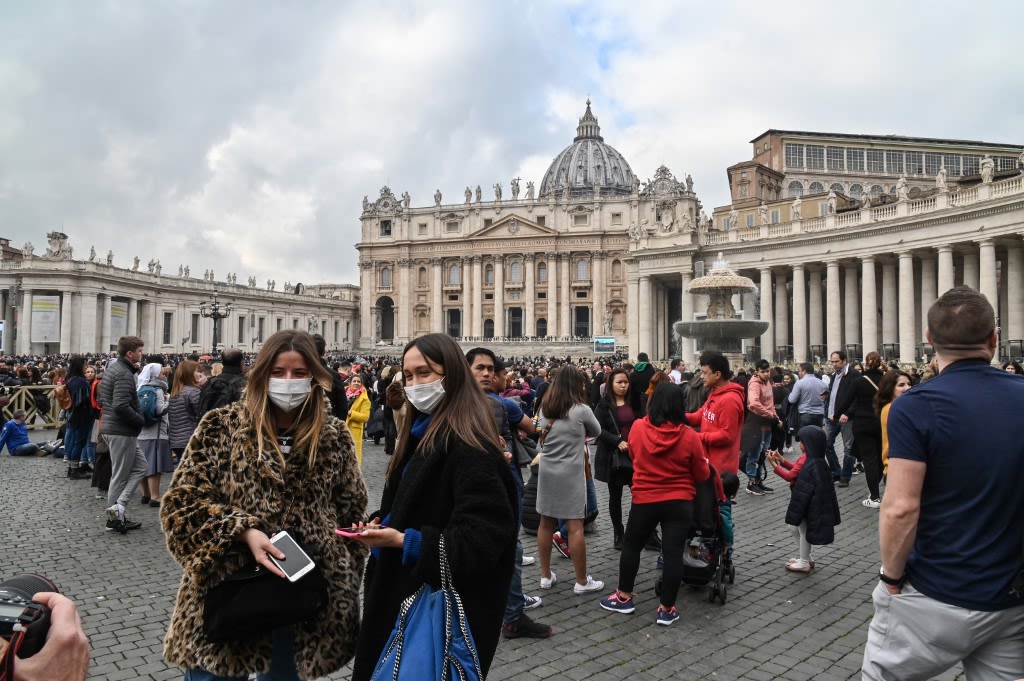
Tourists tour St. Peter's Square prior to the pope's weekly Angelus prayer on Feb. 2 in the Vatican. (Photo by Andreas Solaro/ AFP)
Tourists tour St. Peter's Square prior to the pope's weekly Angelus prayer on Feb. 2 in the Vatican. (Photo by Andreas Solaro/ AFP)
Editor of the Jesuit journal La Civilta Cattolica, Father Antonio Spadaro SJ, who is reportedly a close confidant of Pope Francis, defended the pope’s silence on China in a 7-page long article in ‘Herder Korrespondenz’, a German theological monthly.
“He is very much aware that it must be a case of solving the problem instead of merely condemning [the violations] and grandstanding… Who says that the pope has to speak out personally on all the world’s problems?” Father Spadaro said reported The Tablet.
But there’s a reason for the pontiff’s reticence. More than one commentator this year has pointed out that it’s due to the September 2018 provisional agreement on the appointment of bishops between the Vatican and Beijing which is up for renewal next month.
Supporters of the deal hope it will help unify and ultimately protect China’s 10-12 million-strong Catholic community that was split in two after the communists created the Chinese Patriotic Catholic Association in 1957.
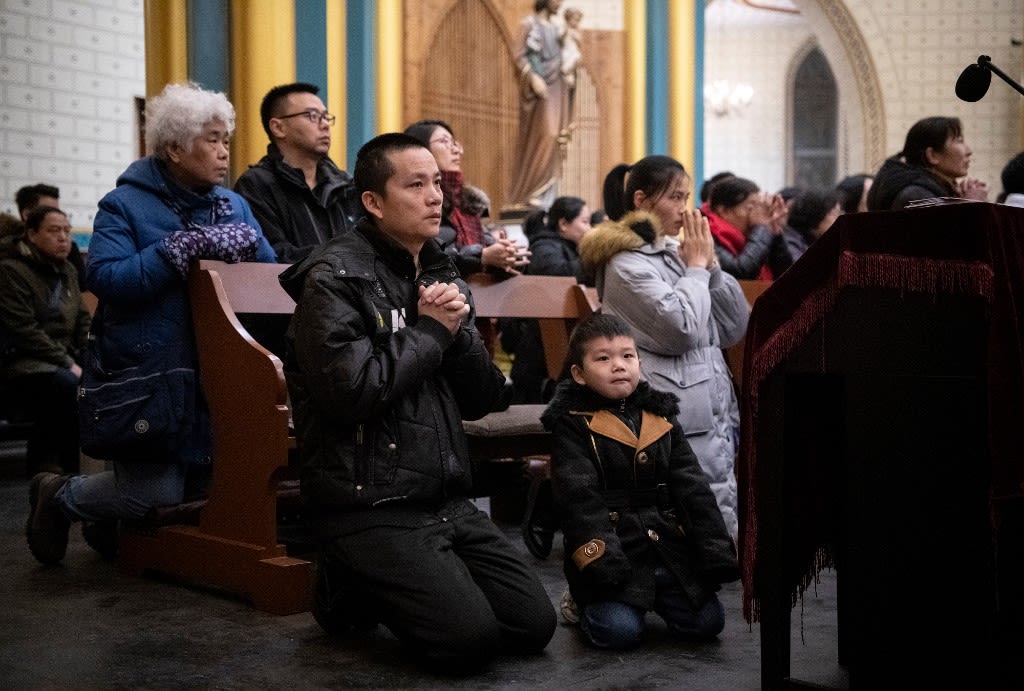
Worshippers attend a Christmas eve Mass at the Xishiku Cathedral in Beijing on Dec. 24, 2019. Xishiku Cathedral is affiliated with the Chinese Patriotic Catholic Association. (Photo by Noel Celis/AFP)
Worshippers attend a Christmas eve Mass at the Xishiku Cathedral in Beijing on Dec. 24, 2019. Xishiku Cathedral is affiliated with the Chinese Patriotic Catholic Association. (Photo by Noel Celis/AFP)
As part of the deal, Pope Francis officially recognized eight bishops (one of whom died earlier in 2017) named by the Chinese state that did not have papal approval.
“Pope Francis hopes that, with these decisions, a new process may begin that will allow the wounds of the past to be overcome, leading to the full communion of all Chinese Catholics,” said a Vatican statement issued Sept. 22, 2018 about the recognition.
In a more recent statement the respected International Society for Human Rights said the purpose of the deal had been to end the conflict between the CCP and the Vatican.
“Instead, however, it has seriously damaged the Church’s international reputation and led to a conflict within the Church. China’s Catholics remain under severe pressure despite the pact,” said the society’s letter released Aug. 13.
So how did we get to a point where this deal has troubled so many?
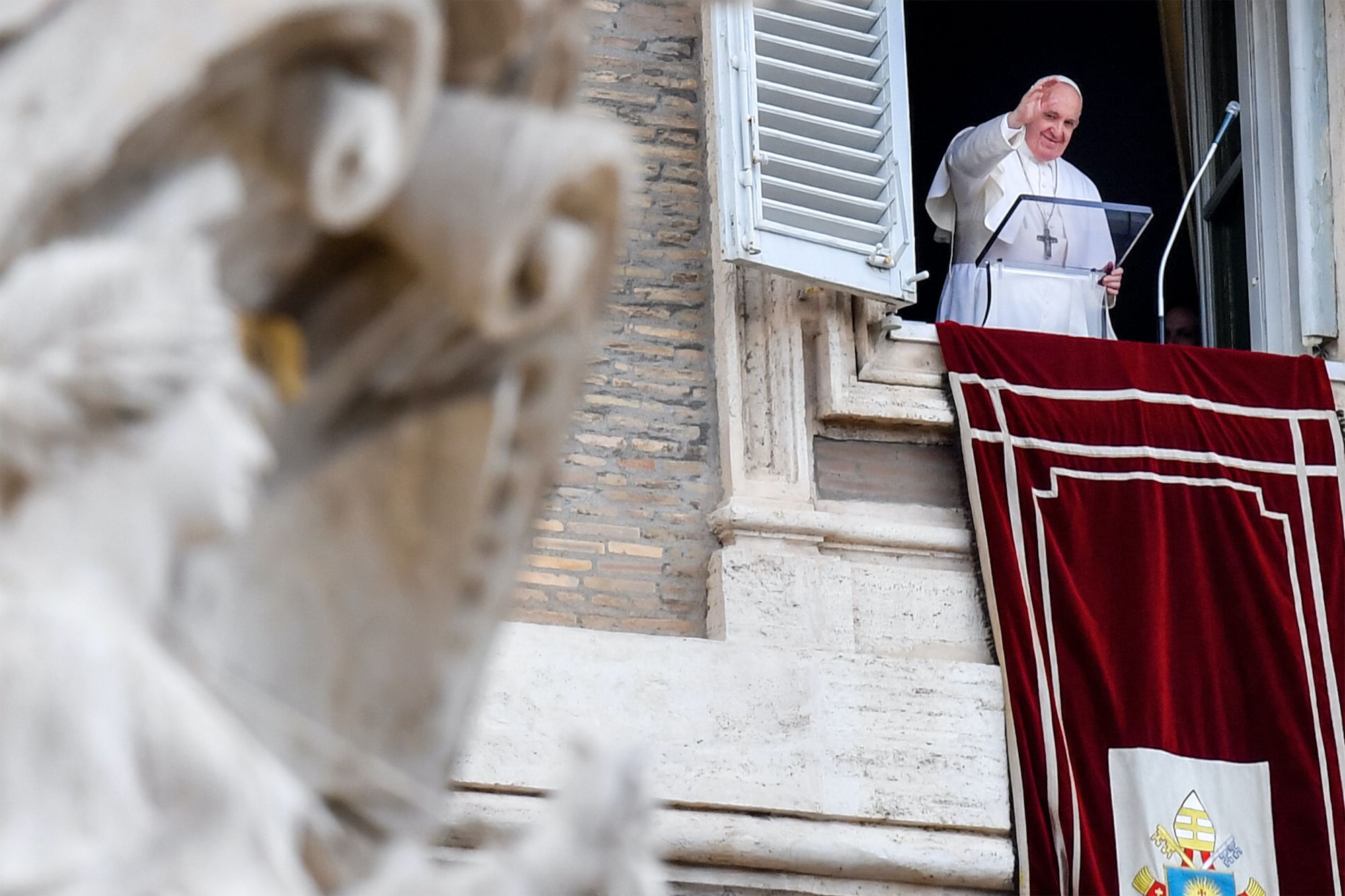
More than one critic of the deal has pointed out that the nature of China’s communist regime would result in nothing good coming from it.
One such voice was the last governor of Hong Kong, Christopher Patten, who earlier this year told The Tablet that
The Vatican has “got it badly wrong about China.”
Patten, a Catholic, said that the human rights abuses being committed against people of faith in China showed how the CCP could not negotiate in good faith.
Going by reports the deal has not made life any easier or safer for China’s underground Catholics.
In general, religious freedom, as touched upon by the faith leaders in their letter, is currently enduring a crackdown not experienced since Mao Zedong’s Cultural Revolution. Disturbingly, there has likewise been credible, and repeated, reports of state-sanctioned forced organ harvesting from prisoners of conscience, mostly Faun Gong practitioners.
China Tribunal Final Judgement Film - 2019 (English)
The most notable and early public critic of the deal is Hong Kong’s Cardinal Joseph Zen who believes it sold out the 5 million or so Catholics of China’s persecuted underground church.
“You can never compromise with a totalitarian regime because they want everything,” Cardinal Zen said in a February interview with the Wall Street Journal. “Would you have encouraged St. Joseph to negotiate with Herod?” he asked.
Cardinal Zen has repeatedly blamed the Vatican Secretary of State Cardinal Pietro Parolin and others in the Holy See and not the pope for the deal.
Now we are waiting for the deal to be renewed in September, and the indications are it will be. The fact that its content remains secret has not helped sell it to the broader Catholic community creating suspicions on what has been bargained.
Well-meaning people certainly want to think the best of their moral leaders, and most Catholics would believe the intent of the Holy See is proper.
However, while the Vatican may have good intent, the same can’t be said for Beijing and the CCP’s participation in the deal lies at the heart of the problem.
Jesuit Father Paul Mariani, professor of Chinese history at Santa Clara University, wrote in America Magazine about the deal back in 2018 that:
“It would be naïve in the extreme to think that the Chinese government wants any positive outcomes for the Church.”
And therein lies the rub; no matter what Holy See officials may say, if meaningful engagement with Beijing has failed everywhere else, it won’t work for the Vatican.
Under the current conditions, no one has put forward a convincing argument how it can. This is a regime, as Gao pointed out, that has, in its history, killed tens of millions of Chinese.
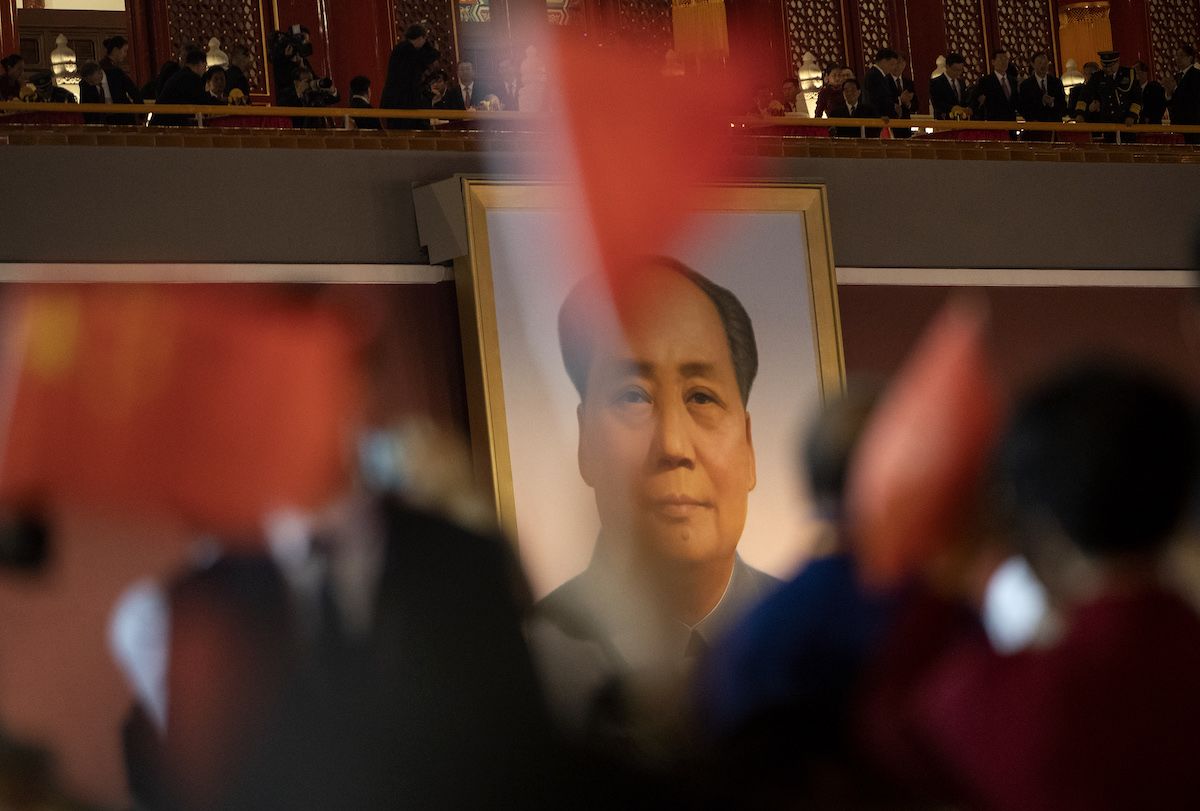
The portrait of former Chinese Communist Party leader Mao Zedong is pictured at a gala in Tiananmen Square in Beijing on Oct.1, 2019, to mark the 70th anniversary of the founding of the People’s Republic of China. (Photo by Noel Celis/AFP)
The portrait of former Chinese Communist Party leader Mao Zedong is pictured at a gala in Tiananmen Square in Beijing on Oct.1, 2019, to mark the 70th anniversary of the founding of the People’s Republic of China. (Photo by Noel Celis/AFP)
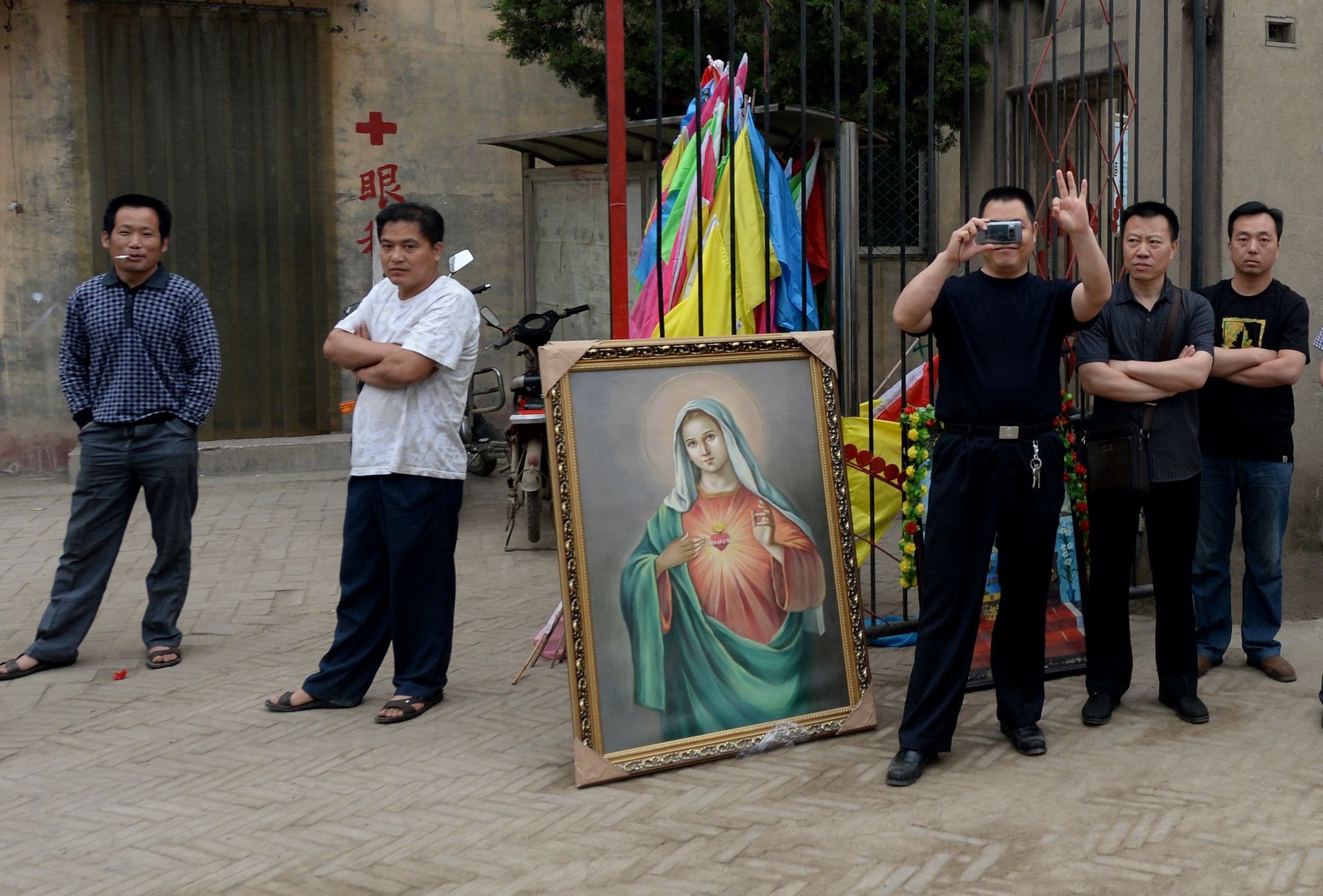
Chinese government and public security officials monitor journalists as they delay the start of a religious parade at the Catholic cathedral in Donglu, Hebei Province on May 26, 2013. Police surrounded a Chinese village to prevent pilgrims from joining a Catholic parade to honor the Virgin Mary, who locals say appeared in the village a century ago. (Photo by Mark Ralston/AFP)
Chinese government and public security officials monitor journalists as they delay the start of a religious parade at the Catholic cathedral in Donglu, Hebei Province on May 26, 2013. Police surrounded a Chinese village to prevent pilgrims from joining a Catholic parade to honor the Virgin Mary, who locals say appeared in the village a century ago. (Photo by Mark Ralston/AFP)
In our dealings with China we now find ourselves facing the biggest moral challenge of our time.
How Pope Francis ultimately responds to it may well, one day, define his papacy.
Given the regime’s track record and the current state of things that people of faith face in China, we can only hope that the pontiff and the Vatican have a red line that can’t be crossed; things that they won’t tolerate, things a moral, spiritual person would not betray.
In the words of English writer and lay theologian G. K. Chesterton:
“Art, like morality, consists of drawing the line somewhere.”
*Tom Shanahan is the penname used by an Asia-based journalist who’d like to be able to travel back to Hong Kong one day, as well as China. The views expressed in this article are the opinions of the author and do not necessarily reflect the editorial stance of LiCAS.news.
Published August 28, 2020
© Copyright MMXX LiCAS.news
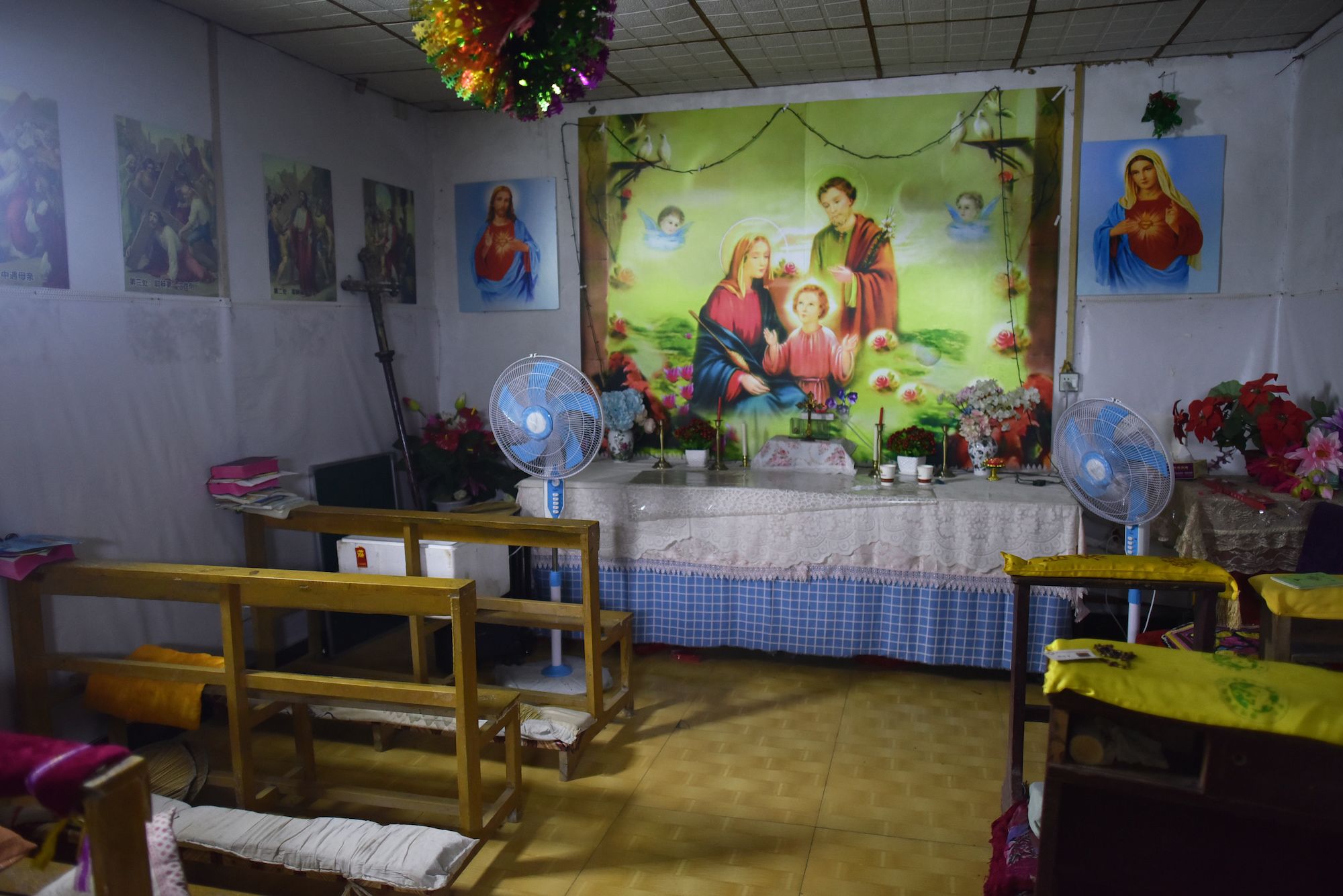
The interior of a house church is seen in Puyang, in China's central Henan province on Aug. 13, 2018. (Photo by Greg Baker/AFP)
The interior of a house church is seen in Puyang, in China's central Henan province on Aug. 13, 2018. (Photo by Greg Baker/AFP)
